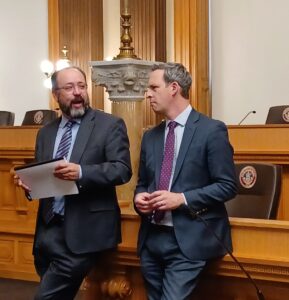Colorado took a step Wednesday toward becoming the first state to create standards for development and use of artificial intelligence, as a Senate committee advanced a bill to launch a regulatory process despite concerns about the bill’s definitional vagueness.
Senate Bill 205, sponsored by Democratic Senate Majority Leader Robert Rodriguez of Denver, sprang from a multistate task force of legislators that began meeting last summer in an attempt to put guardrails around what is seen as a transformative technology. Pleas from a large swath of technology professionals for federal regulation of self-learning programs have not led to congressional action, prompting Connecticut state Sen. James Maroney to form the bipartisan effort to put something forward in states.
Rodriguez’s bill does not seek to limit the spread of artificial intelligence, which is used in everything from consideration of job applicants to determinations of insurance rates to the writing of documents through ChatGPT, so much as to create developer accountability. SB 205 would establish standards to protect against biases being written into AI — particularly programs that make decisions on issues like whether to approve a loan application —and require companies that use AI in consumer interactions to disclose that fact.
“I think what I’m trying to do is build a chassis for common-sense base regulations,” Rodriguez told the Senate Judiciary Committee, saying that he wants this bill, like his 2021 Colorado Privacy Act to be adaptable as technology changes and advances. “Colorado can take action to put in place common-sense actions that the AI companies already should be doing. At the base of this bill is just accountability, assessments and disclosures that people can know when they deal with artificial intelligence.”

Colorado Senate Majority Leader Robert Rodriguez and Senate President Steve Fenberg speak after a caucus meeting in September.
How the bill regulates artificial intelligence companies
Although Rodriguez introduced SB 205 just two weeks ago, he rewrote significant portions of the measure this week to reflect changes happening to a counterpart bill in Connecticut and said there likely are more amendments coming. But as of now, the main provisions of the bill include:
- A requirement that developers of high-risk AI systems — any system that makes a “consequential decision” — use reasonable care to protect consumers from algorithmic discrimination and disclose to deployers of the system documentation on the type of data used to train the system;
- A requirement that deployers of high-risk AI systems protect consumers from known or reasonably foreseeable risks of algorithmic discrimination via implementation of a risk-management policy and an impact assessment of the system;
- A mandate that, beginning in 2026, developers of general-purpose AI models shall maintain documentation on the training and testing of the model and make available to someone who intends to integrate the model into their AI systems information on the capabilities and limitations of the model;
- A requirement to disclose to consumers interacting with high-risk AI systems that they are, in fact, interacting with an artificial intelligence system;
- A duty for developers of AI systems that generate or manipulate synthetic digital content like images and video to ensure the content is marked and detectable as synthetic; and,
- An allowance for the Colorado attorney general’s office to enforce the provisions of the bill, allowing for opportunities to cure certain alleged violations and permitting as an affirmative defense the finding of alleged violations through testing or internal review.
“A lot of chaos”
Committee members voted 3-2, along a Democratic-majority party line, to advance the bill the Senate floor. However, aside from a group of students that Rodriguez didn’t realize were coming to support the bill, everyone who testified on SB 205 either asked for legislators to amend the bill or for the committee just to kill it.
The biggest concern from those seeking changes — a combination of business groups and state agencies — was that a groundbreaking bill on such an important topic was coming together too quickly just two weeks before the end of the legislative session. Passing a measure with unclear definitions could spark hesitancy among potential entrepreneurs and investors to plant or grow their business in a state that may put more limits or liability onto them than competitor states, several said.

Loren Furman is president and CEO of the Colorado Chamber of Commerce.
Colorado Chamber of Commerce President/CEO Loren Furman and Michael McReynolds, senior manager of government affairs for Gov. Jared Polis’ Office of Information Technology, both suggested legislators should create a task force to study a proposed law instead. What may seem like sensible regulations today may be obsolete or outdated quickly with the evolving technology, and such rigid mandates could deter investment around new technologies, McReynolds warned.
“It throws our company into a lot of chaos as we figure out what we need to comply with,” said Jon Nordmark, co-founder/CEO of Iterate.AI and a board member of the Colorado Technology Association. “I don’t know what this bill will turn into legally. We’d probably be letting go of software developers to get lawyers to figure out how we try to comply.”
Startups worried bill could limit investment
Those who opposed SB 205, largely the founders of AI startup companies, had similar misgivings but said the flaws were serious enough that they would have to consider relocating rather than getting caught in a regulatory trap. Thumper.AI founder/CEO Logan Cerkovnik called the bill’s provisions a de facto ban on releasing open-source AI models, while Santa Technologies founder Mike Boucher said the bill regulates the means of generating content through AI rather than the final product of false synthetic content.
Meanwhile, Colorado AFL-CIO lobbyist Kjersten Forseth took a different tact and opposed SB 205 because she said it does too little to allow government to rein in development of potentially harmful AI programs. The bill relies on self-reporting, leaves definitions too open to enforce and gives AI developers rebuttable presumptions that they didn’t mean to generate algorithmic discrimination, she said.
“Giving an industry self-regulation under the guise of innovation is simply a cloak with a dagger hidden in it,” Forseth said.
But Rodriguez, who pushed back the proposed implementation date from July 2025 to October 2025 in his rewrite of the bill, said the lengthy rulemaking period would serve the same purpose as a task force in getting the details right, without delaying the law further. Much like Colorado’s third-in-the-nation data-privacy act, which is being expanded to fit new technologies this session, SB 205 is a regulatory skeleton rather than a definitive set of rules, and the state can’t wait for the federal government to act, he said.
“This bill isn’t about trying to change the world right now,” he said. “It’s always been about a framework for accountability.”
The Legislature has until May 8 to pass any bills that it aims to become law this year.
